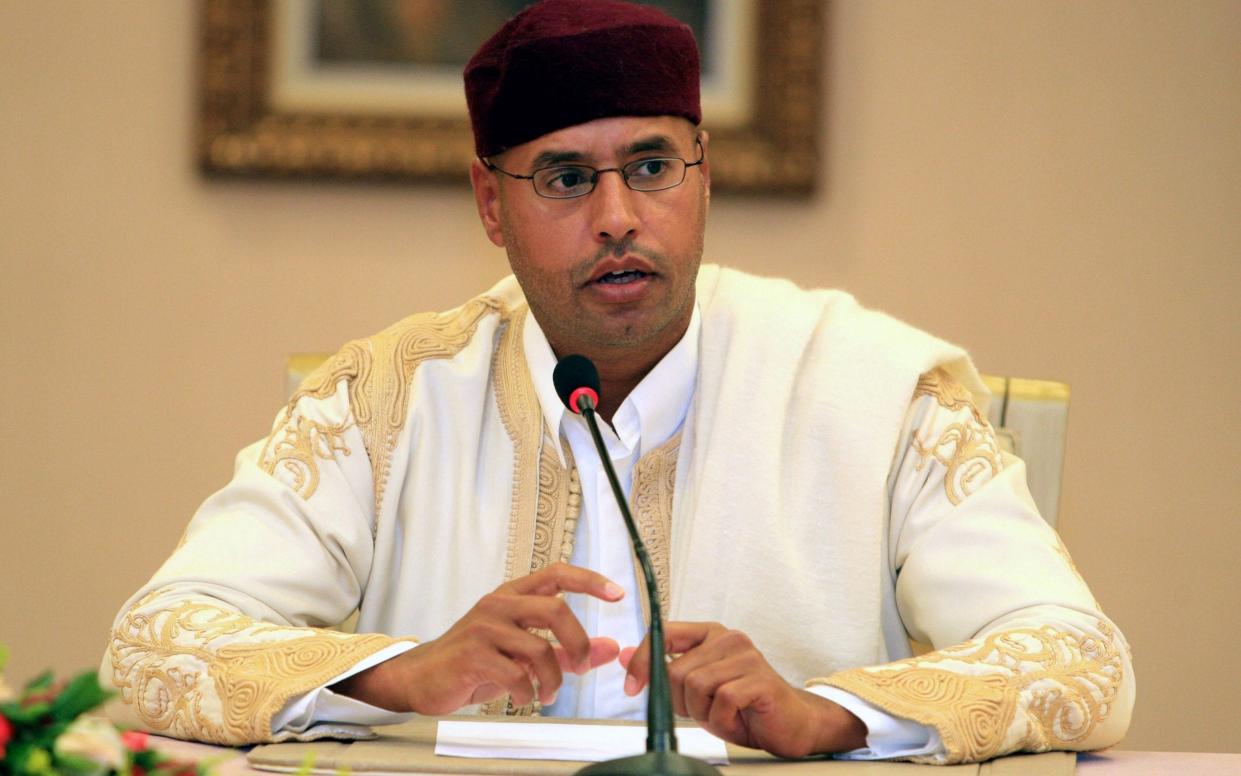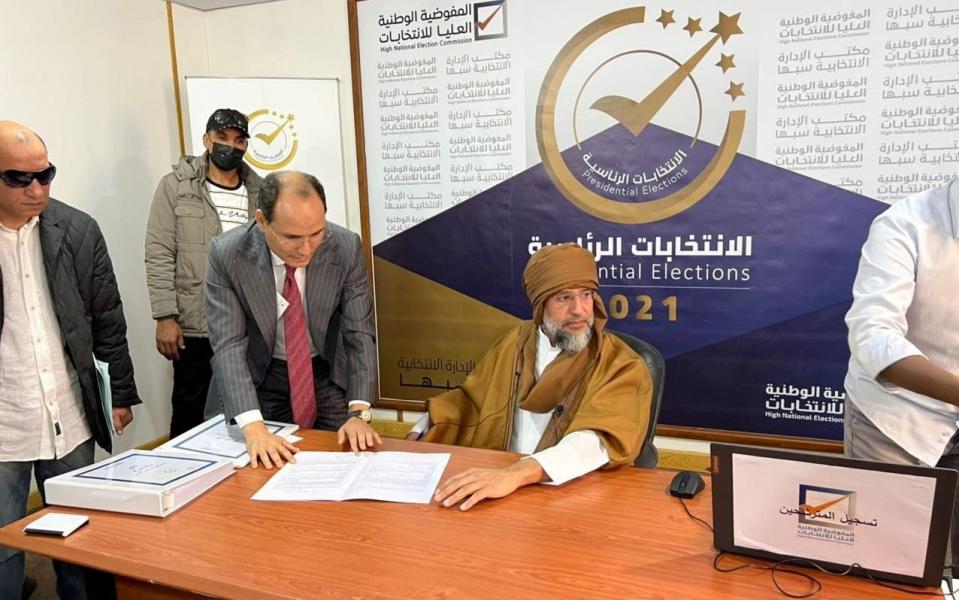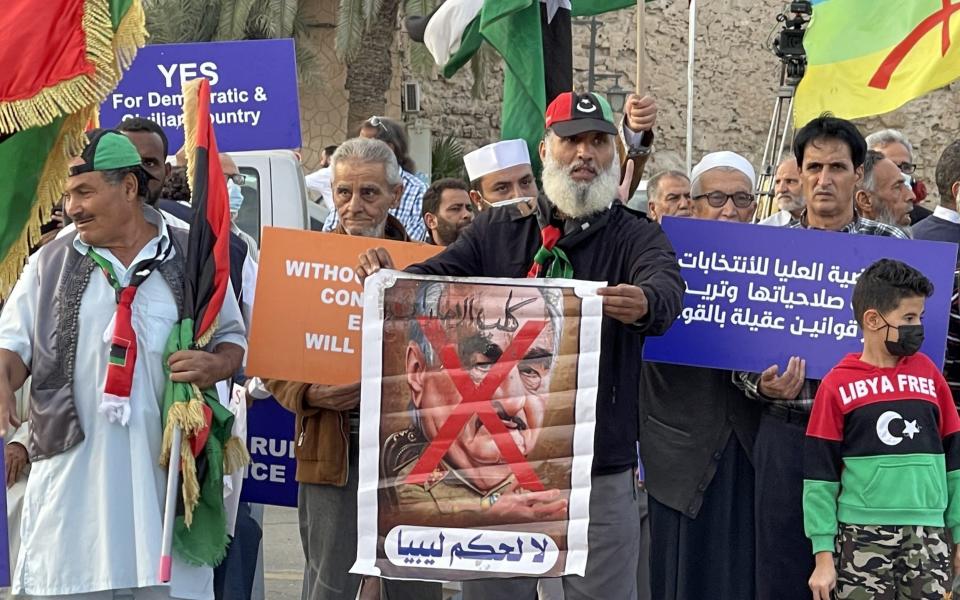Colonel Gaddafi's London-educated son attempts to relaunch his father's dynasty

- Oops!Something went wrong.Please try again later.
- Oops!Something went wrong.Please try again later.
Ten years ago this spring, Libyans rose up to overthrow the man who had ruled them with an iron fist for more than three decades.
Now, his son wants to make a dynastic comeback.
Saif al-Islam Gaddafi, the second son of Colonel Muammar Gaddafi, is poised to run for president in internationally sanctioned elections later this month after a court overturned objections to his candidacy on Thursday evening.
Educated at the London School of Economics, Saif al-Islam for many years styled himself as the moderate, modernising force inside his father’s regime.
That changed in 2011, when he threw in his lot with his father against an anti-government uprising later backed by Nato. After his father was killed, he was captured and held prisoner by a militia from the city of Zintan for several years before his release in 2017.
In his only interview since he resurfaced this summer, he said he intended to reunite the country under his father's Green movement and claimed many Libyans believed his regime should have dealt even more harshly with the opposition.
And when he appeared in public to file his candidacy papers last month, he was swathed in the same ochre Bedouin robes favoured by his father, in an unapologetic attempt to create continuity with the previous government.

Polling data in Libya is patchy and unreliable.
But many observers believe that nostalgia, combined with strong name recognition, might well be enough to secure him a respectable share of the vote - especially in traditional strongholds of the Gaddafi clan in the country's south.
“He has not been involved in politics for a decade, and that is to his advantage,” said Hassan Morajea, a Libya analyst for the COAR Global political risks agency. “People have very fresh memories of the chaos of the past 10 years. But they have hazier memories about why they forced out his father in 2011.”
More than 80 candidates have registered to run in the first round of presidential elections scheduled for December 24. Libya's High National Elections Committee is due to publish the final approved list of candidates on Tuesday.
Prominent candidates include Gen Khalifa Haftar, the renegade field marshal who laid siege to Tripoli for a year in 2019-2020. He has presented himself as a strongman leader capable of facing down the threat of militant Islam. Critics say he is a would-be military dictator.
Gen Haftar, who would also be chasing voters sympathetic to the former regime, on Monday sent troops from his self-styled Libyan National Army to stop Mr Gaddafi's lawyer from delivering his appeal to the courthouse in the desert town of Sabha. That resulted in an almost comic standoff outside the court building, but the lawyer eventually got through.
The third big beast in the vote is Abdulhamid Dbeibeh, a construction tycoon from the western city of Misrata who is the current interim prime minister. Mr Dbeibeh initially promised not to run for election, but is thought to have built up considerable support in the West of Libya partly by raising salaries. Many Western observers believe he is the front runner in the race.

Other candidates include Fathih Bashagar, a former interior minister and fellow Misrati who has cultivated ties with Turkey and Western governments.
The international community made the elections a key part of a ceasefire deal that ended the battle of Tripoli last year. They hope it will provide a clean slate on which to build a political settlement that will end a decade of war and civil strife as rival militias and warlords fought for dominance.
But doubts are growing about whether the vote will go ahead as planned.
There is little more than two weeks left to campaign, electoral law is a mess, and rival militia groups have been on recruiting drives in preparation for the power struggle on the streets that many assume will follow the vote. "Security violations" - diplomatic code for gun battles - are widely assumed to be inevitable.
"I don't think anything is going to happen this year and this is not because there are just a few minor technical details to be fixed, its because the only electoral laws that were embraced by international community are weak, incomplete and controversial," said Jalel Harchaoui, a senior fellow at the Global Initiative against Transnational Organized Crime.
"We are not going to relapse into the spectacular fireworks type of war of 2019 to 2020. [Candidates] need to be the big bad kid on the block in order to be heard in the context of negotiations. But of course you need to look scary and compelling if you want to get heard," he added of the militia build up.
That is another factor that militates against a Gaddafi return.
Gen Haftar’s Libyan National Army - itself made up of a large number of co-opted local militias - may have been defeated in its bid to storm Tripoli, but is still a very potent force that dominates eastern and southern swathes of the country.
Mr Dabaiba is an influential figure in Misrata, a trading port that often behaves like an autonomous city-state and fields a powerful band of militias that were key in thwarting Gen Haftar's grab for Tripoli.
Mr Gaddafi, by contrast, has no military muscle and is effectively in hiding, fearful of assassination or arrest. He survived at least one attempt on his life in 2017, is still wanted by the International Criminal Court in the Hague, and has yet to clear the 2015 war crimes conviction.
In August Libyan prosecutors issued a fresh arrest warrant over his alleged link with the Russian mercenaries from the Wagner private military company.
There are widespread rumours that Wagner mercenaries, who fought for Gen Haftar in the siege of Tripoli but since appear to have abandoned the general, provided the security when he showed up in Sabha to lodge his application as a candidate in November.
Russia is known to have reached out to Mr Gaddafi to balance its reliance on Gen Haftar, but foreign backing is hardly an advertisement for a man claiming to be beloved by his public.
Mr Gaddafi's candidacy is still not certain - the elections commission said on Friday it intended to appeal against the appeal. But ironically, that might play to his advantage.
"Saif is not popular among everyone. And he doesn't have an armed force and he has to come out of hiding - that does not add up to a strong position," said Tim Eaton, a Libya watcher at the Chatham House think tank. "But if excluded he can avoid being tainted by an election defeat and remain on the scene."

